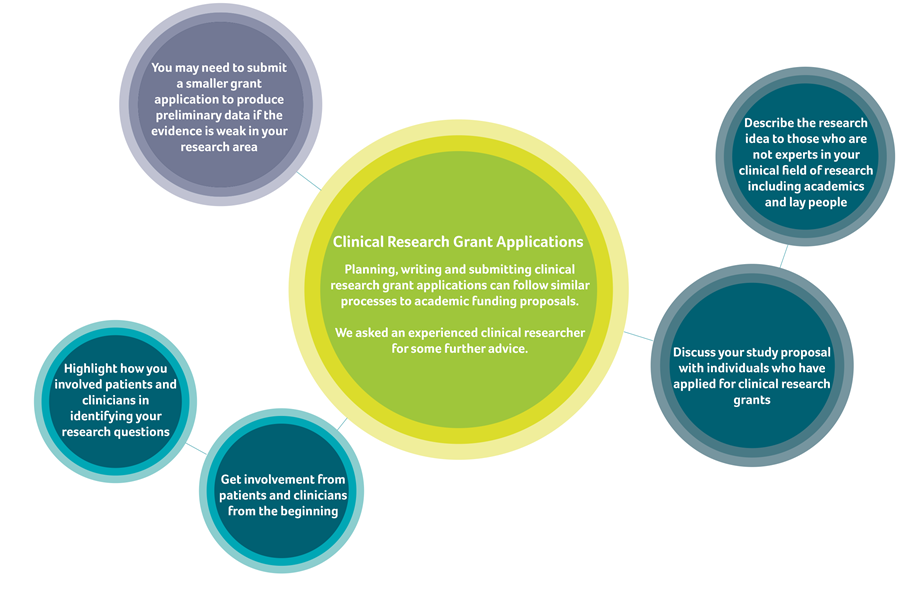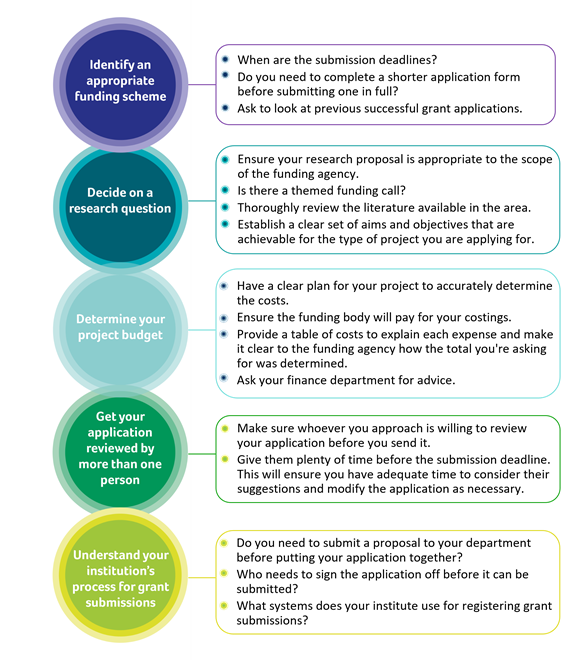
As a postdoctoral researcher, I wanted to pursue interests outside the scope of my main project, so I set out to obtain additional funding. My first attempts at applying for grants didn’t go well – I was unsuccessful with two applications. I am sure this experience is familiar to readers.
As disheartening as this was, I gained a lot from the feedback, and the experience strengthened my determination to secure the extra funding; successful grant applications are dependent on understanding the grant writing process.
After reorganising my approach to writing grants, I was successful in obtaining a €20,000 ESCMID Research Grant, and a Microbiology Society Harry Smith Vacation Studentship Award of £2,320 to host a student in the lab.
In this blog I will share with you what I learnt in my pursuit for grant funding.
It is important to invest a good amount of time exploring the types of grants available, the scope of different funding agencies and making sure you are eligible to apply.
Being organised by establishing key application deadlines and subscribing to funders’ newsletters is essential, as writing a good application will always take longer than you expect.
Set aside time to speak with your peers and supervisors about the funding opportunities you find and to get advice on where best to apply. Once you identify potential grants, you can look at past awardees and get in touch for advice on the application process.
Review successful grant applications for the programme you are applying to, this will give you a better sense of what is expected, the amount of information required in each component, and the appropriate way to structure your application.
It is vital to make sure you thoroughly read and understand the funder’s application processes and their guidance and if anything is not clear, don’t be afraid to contact them for clarity.

Deciding on a research topic was a challenge: I was under the impression that the project needed to be ground-breaking to the field and make a large impact. For the types of small grant funding I was applying for, a research proposal that was appropriate to the scope of the funding agency with straightforward and achievable aims and objectives, was the way forward.
My advice is:
Make sure you review the literature in your area to determine what has been done and where the knowledge gaps are. Consider the expertise and abilities you already possess, as well as the areas in which you want to gain experience and would enjoy learning. Don’t write in isolation, make time to discuss your ideas with people, this will help to develop the research justification, and project design.
Taking time to establish a robust research question and thoroughly addressing how the aims of the project will be achieved, are an important part of the grant-writing process. Additionally, show that you are aware of potential problems you could encounter during the project and how you plan to deal with them if they arise.
It is beneficial to gather preliminary data for the application – I carried out quick, low-cost experiments to test my hypothesis. The likelihood of obtaining preliminary data will be increased if you choose a research area that is not too far from a current project or something you have done in the past.

The key to effective budgeting is to have a clear set of methodologies laid out for each stage of the project. Be realistic with the costs, make sure they are justifiable and within the maximum amount you can apply for.
Additionally, confirm that the funding organisation, to which you are submitting, will let additional funds come from other sources if required. If your project necessitates laboratory kits or the use of a specific instrument, get quotes and set up meetings with specialists who oversee the equipment you will be using. Ensure you thoroughly understand exactly what the funding agency will cover in costs from their terms and conditions.

Planning for more than one person to review your grant application is crucial. I chose my postdoc supervisor, who had expertise in writing successful grants, and an established professor from a different department with relevant subject expertise.
Find out who needs to sign-off your grant application and whether it needs to be registered with your institution’s funding system. These extra tasks will take time and will throw up unexpected obstacles – I discovered that grants need to be registered to different university systems for different types of funding schemes. Establishing a good relationship with the finance department and knowing who the best points of contact are for managing of research projects at your institute is invaluable.
Plan to have everything finished 2-4 weeks before the submission deadline: there will always be something to chase, a signature to obtain or a modification to be made before the application can be submitted.

This blog was discussed with Dr Andrew Kirby, Vice-chair for HIS Research Committee, and it was agreed that the processes of writing first time grant applications are similar when applying for clinical research grants. Additional advice includes:
 Get involvement from patients and clinicians - make sure they agree with the priorities and are interested in being involved in your research.
Get involvement from patients and clinicians - make sure they agree with the priorities and are interested in being involved in your research.
 If you want patients to be included in trying out your new intervention, ensure they have consensus regarding the study topic.
If you want patients to be included in trying out your new intervention, ensure they have consensus regarding the study topic.
 Clearly describe in your application how you involved patients and physicians when generating the research questions.
Clearly describe in your application how you involved patients and physicians when generating the research questions.
 Understand there may be a difference between the clinical research you want to do, and the requirements of the funder, so be prepared to modify your idea.
Understand there may be a difference between the clinical research you want to do, and the requirements of the funder, so be prepared to modify your idea.
 Often when you start looking at an area, the evidence base can be weak, and you might have to start with proving some basic principles before you can get to your research question.
Often when you start looking at an area, the evidence base can be weak, and you might have to start with proving some basic principles before you can get to your research question.
 Try explaining the project to people outside of your clinical specialty, they might be the most apt critics.
Try explaining the project to people outside of your clinical specialty, they might be the most apt critics.


I imagined that grant-writing was a means to an end; a way to pursue my research interests. However, in the process of preparing grant applications I gained a lot of skills necessary to becoming an independent researcher. In writing applications and managing the awarded projects I advanced my project and financial management skills, both of which were beneficial for my professional development. It was also very rewarding running my own research projects and seeing my ideas translate into exciting data.
Don’t give up if you are unsuccessful when you start writing grants, and don’t be afraid to ask those with expertise for advice along the way. The more you write the better experienced you will become.
